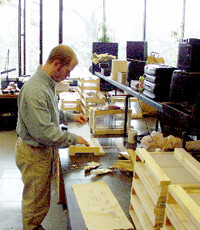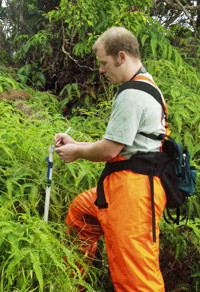Pro-File InterviewsMichael Booth, Ph.D. Student
This interview with Michael Booth, a Ph.D. candidate in plant community and ecosystem ecology at Yale University in New Haven, CT, was first published in shorter form in the April 2001 issue of The Planet Scout Gazette. You could say that Michael is "well grounded" in soil science.
----------------------------------------------------- What is your job title? Ph.D. student What do you do in a typical day? Most basically, I study how plants live and interact with each other in forest ecosystems. I am particularly interested in mycorrhizas, partnerships in which plants and fungi cooperate to help the plants get nutrients and to help the fungi get sugars. To do this I spend a lot of time setting up experiments, collecting and analyzing plant and soil samples, computing statistics, reading about what other scientists have done, and writing about my discoveries. How do you feel about people referring to soil as "dirt"? That's okay in the right context. If it is ground into your socks or on your face, soil can be dirt. Otherwise, I'd call it soil. How does your job affect the environment? Well, things that I learn about plant life can be used by foresters, who grow trees for wood products and wildlife, and other natural resource managers so that they can manage our environment more sustainably. Describe a recent accomplishment that you feel is significant. I helped to develop a so-called "universal" plant primer that should allow us to amplify the DNA of almost any land plant. This is important because it is very difficult to know which roots belong to which trees when studying belowground ecosystems. Using this primer, we can now identify mysterious plant roots when conducting ecological studies. What qualifications do you need to do your job? Patience. A lot of science involves learning from mistakes. One also needs to have a broad background in science including biology, chemistry, geology, and mathematics. Most importantly: a love of living things - an inexhaustible sense of wonder about the complexity and beauty of nature. I think this is the most solid foundation on which environmental scientists can build their careers. 
What advice would you give to a Planet Scout who might want to work in your field? Take lots of math. Ecology involves a lot of it, and too many ecologists haven't taken enough of it. I would also encourage Planet Scouts who are interested in ecology to find a particular organism, group of organisms, or ecosystem that fascinates them and to concentrate on learning everything they can about it. It is good to know a lot about a wide variety of ecosystems and organisms, but I think it takes special concentration on one system in order to make new discoveries. What is your biggest environmental concern, and what do think should be done about it? I can't prioritize concerns as I think so many of them are linked. But I believe human population growth is one of the events at the center of many issues. This directly impacts water availability, all forms of pollution, natural resource extraction, biodiversity loss, and climate change. As for what to do about it, I think an important thing is education. People in many parts of the world have social customs that encourage having larger families than their natural resources can sustain. In many places, including our own country, we don't necessarily make connections between population growth, environmental health, and economic development. Helping people to see these relationships and helping them to make ethical choices based on their understanding is essential. Many political and economic issues come to bear on this subject, too. It is interesting that we see some of the greatest population pressures in some of the most politically and economically unstable regions in the world. Why did you decide to work in this field? I love nature - its beauty, its complexity, and its simplicity. What is your favorite part of your job? Playing and working in the field. Seeing creatures, plants, and other organisms that are new to me for the first time. Interacting with scientists from around the globe.
----------------------------------------------------- |
 |